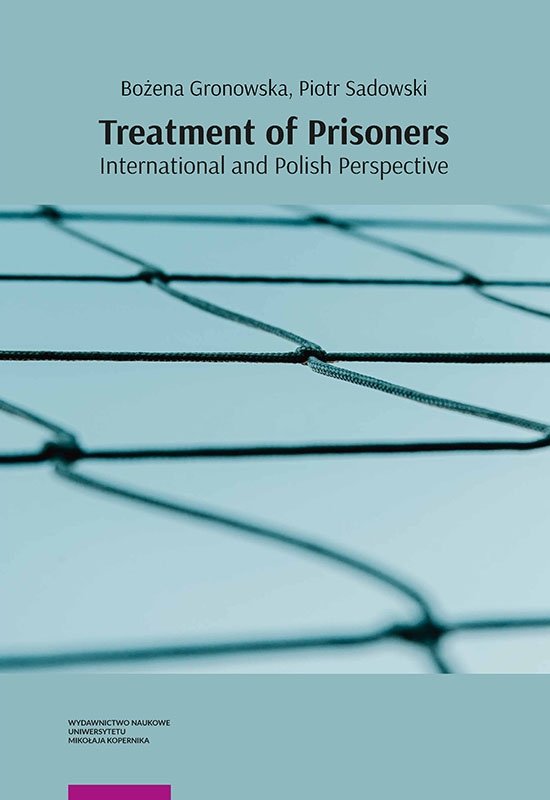Kierownik Katedry Praw Człowieka na Wydziale Prawa i Administracji Uniwersytetu Mikołaja Kopernika w Toruniu. Autorka i współautorka ponad 200 publikacji naukowych, w tym monografii i artykułów naukowych dedykowanych procedurze karnej, kryminologii, wiktymologii, prawu penitencjarnemu oraz ochronie praw człowieka (wymiar krajowy i międzynarodowy).
Treatment of Prisoners – International and Polish Perspective
List of Abbreviations / 7
Introduction / 9
Chapter 1. Deprivation of liberty in the context of criminal justice system / 17
1.1. General remarks / 17
1.2. Deprivation of liberty – its nature and aims / 23
1.3. Classification of prisoners – consequences / 26
1.4. Basic penitentiary paradox / 29
1.5. Prison of the 21st century / 31
Chapter 2. Contemporary penitentiary standards and policy – normative aspect / 37
2.1. Treaty standards / 38
2.1.1. General treaties / 38
2.1.2. Special treaty regulations / 43
2.2. Recommended standards / 45
2.2.1. Universal level / 45
2.2.2. Regional level / 49
2.3. Domestic impact of international standards – Polish example / 53
Chapter 3. Prison population – human dimension of personal interrelations / 57
3.1. The prisoners / 57
3.2. The prison staff / 66
3.3. Interpersonal confrontations and their consequences / 71
3.3.1. Horizontal personal interrelations / 72
3.3.2. Vertical personal interrelations / 76
3.4. Examples of extreme personal interrelations (prison scandals in
a nutshell) / 78
Chapter 4. Social rehabilitation of prisoners – between idea and reality / 83
4.1. An idea of “normalization”/ 83
4.2. A concept of the “implied limitations”/ 90
4.3. Main instruments of social rehabilitation / 92
4.3.1. Contacts with the outside world – possibilities / 92
4.3.2. Special offers inside the prisons / 95
4.3.2.1. Work / 95
4.3.2.2. Education / 98
4.3.2.2.1. Spiritual assistance / 99
4.3.2.2.2. Leisure time / 101
4.3.2.3. Treatment programs / 102
4.4. Preparation for release / 104
Chapter 5. Prison life and human dignity – situations of special risk / 107
5.1. Brief introductory remarks / 107
5.2. Problem of discrimination / 108
5.3. Prison order and coercion measures / 110
5.3.1. An authorized coercion actions in prison / 112
5.4. Health care “in” and “out” of prison / 118
5.5. Disciplinary procedure and sanctions / 122
Chapter 6. Control, inspections and basic procedural guaranties for prisoners / 127
6.1. Domestic level / 129
6.2. International level / 132
6.2.1. Complaint/petition procedures / 132
6.2.1.1. Council of Europe / 132
6.2.1.2. European Union / 134
6.2.1.3. United Nations Organization / 135
6.2.2. Additional monitoring procedures / 137
Final remarks / 139
Bibiography (Basic Literature) / 147
Appendices / 155
Bożena Gronowska
- 25-lecie wejścia w życie Europejskiej Konwencji Praw Człowieka w Polsce
- Treatment of Prisoners – International and Polish Perspective
Piotr Sadowski
Adiunkt w Katedrze Praw Człowieka na Wydziale Prawa i Administracji Uniwersytetu Mikołaja Kopernika w Toruniu. Autor publikacji poświęconych problematyce respektowania praw człowieka w kontekście imigracji i udzielania cudzoziemcom ochrony międzynarodowej oraz poszanowania prawa prywatnego i rodzinnego. Koordynator i uczestnik projektów międzynarodowych dotyczących migracji i azylu.
- 25-lecie wejścia w życie Europejskiej Konwencji Praw Człowieka w Polsce
- Treatment of Prisoners – International and Polish Perspective
- Wspólny Europejski System Azylowy – historia, stan obecny i perspektywy rozwoju
Powiązane

Aspekty finansowe, prawne i organizacyjne sportu akademickiego
Wojciech Kiełbasiński, Bartłomiej Rosiak
Solidarity. The Martial Law in Poland. First days
Wojciech Polak
Economics and Law. Economic Crises with special emphasis on institutional conditions. 6th Scientific Conference, 15-16 September 2015, Toruń, Poland
Ilona Pietryka
Dylemat więźnia. Ostracyzm ateński i jego pierwotne cele
Marek WęcowskiInne z tej kategorii

Obowiązki edukacyjne. Analiza administracyjnoprawna
Dominika Zawacka-Klonowska
Kluby i związki sportowe w Polsce. Aktualne problemy prawne

Kompetencje Rzecznika Praw Obywatelskich w zakresie kontroli uchwał organów stanowiących jednostek samorządu terytorialnego
Marcin Dorochowicz






